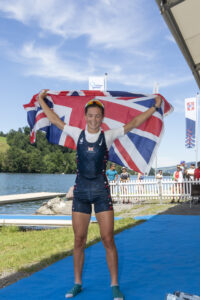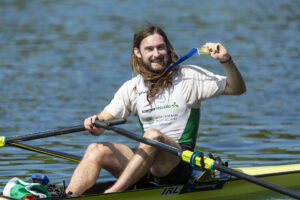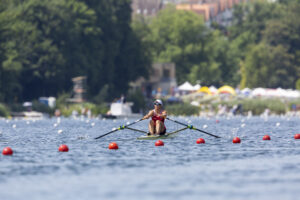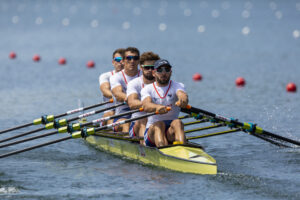Semi-final day at the LUCERNE REGATTA
43 races were on the racing program on the second day of competition at LUCERNE REGATTA. Once again, fair conditions prevailed for the athletes in the contested races, where the finalists were chosen for Sunday’s finals.
Copy and paste: What was true for the conditions for athletes and spectators on Friday’s first day of competition was also true on Saturday at the LUCERNE REGATTA, which concludes the World Cup series. Pleasant temperatures, good water and now and then a breeze, which, however, decreased more and more after the lunch break. Mainly semifinals, the last hope heats, the C, D and E finals as well as the finals of the non-Olympic lightweight categories were on the agenda.
Most successful rowing nations
The semifinal eliminations for Sunday’s (largely) A finals saw France and Italy as the most successful nations. They each made six finals. The national delegations of Germany, Australia and Great Britain can boast five final places.
First final decisions
The first decisions of the non-Olympic lightweight boat classes already took place on Saturday. Outstanding in the women’s skiff was imogen Grant from Great Britain, who realized a new world best time with 07:23.36 and relegated the surprising Mexican Kenia Lechuga and the South African Kirsten McCann to the other medal places. In the men’s race, favored Irishman Paul O’Donovan won ahead of Belgian Tibo Vyvey and Uruguayan Bruno Cetraro Berriolo, while Australian Oscar McGuiness, who led until halfway through the course, was still tied for fourth place.
In the men’s race, favored Irishman Paul O’Donovan won ahead of Belgian Tibo Vyvey and Uruguayan Bruno Cetraro Berriolo, while Australian Oscar McGuiness, who led until halfway through the course, was still tied for fourth place.

Only two nations were still competing in the lightweight double sculls. Germany won, with the Netherlands following in second place.
The second day of competition from the Swiss point of view
In the women’s single sculls Jeannine Gmelin won her semifinal with aplomb. Still in second place at 500 meters, she took command, always kept a safety margin on the competition and won safely. Diana Dymchenko, the Ukrainian now competing for Azerbaijan, and Emma Lunatti from France followed on the places.

The third place for the final qualification had to be achieved by Raphaël Ahumada and Andri Struzina in the lightweight double sculls, and that’s exactly what the duo did. Norway’s Tjoem/Benske and Italy’s Soares and veteran Ruta were even faster.
Lightweight skiers Olivia Nacht and Eline Rol were drawn in the same semifinal. From the start they were on the defensive and could never seriously flirt with qualifying for the final. The ranks 4 for Olivia Nacht and 5 for Eline Rol were the place-wise yield. In the B-Final, Eline Rol from Geneva immediately went on the offensive, but then had to let Czech Kristyna Neuhortova and French Aurelie Morizot pass in the third quarter of the course. Olivia Nacht had to settle for 4th place.
The men’s double sculls with Maurin Lange and Jonah Plock did not manage to repeat their success at the World Cup II in Poznan. They were behind from the start and finished sixth in the semifinals, which meant they were relegated to the B-finals.
Also for the men’s double four with Jan Schäuble instead of the stroke Kai Schätzle, who was absent due to illness, Patrick Brunner, Nils Schneider and Dominic Condrau the hurdle for the final entry was too high. Although catching up on the competition in the end, the result was “only” the sixth place, which means the B-final qualification.
Scott Bärlocher started in the C-final of the skiffiers. After a slow start, he took command halfway through the course and was the first to cross the finish line as heat winner – and thus 13th overall – against the emerging competition from Australia and Germany.
The women’s double Fabienne Schweizer and Nina Wettstein – not yet fully recovered from the effects of illness – competed in the C final. In the end, the duo took 14th place in the overall standings.


